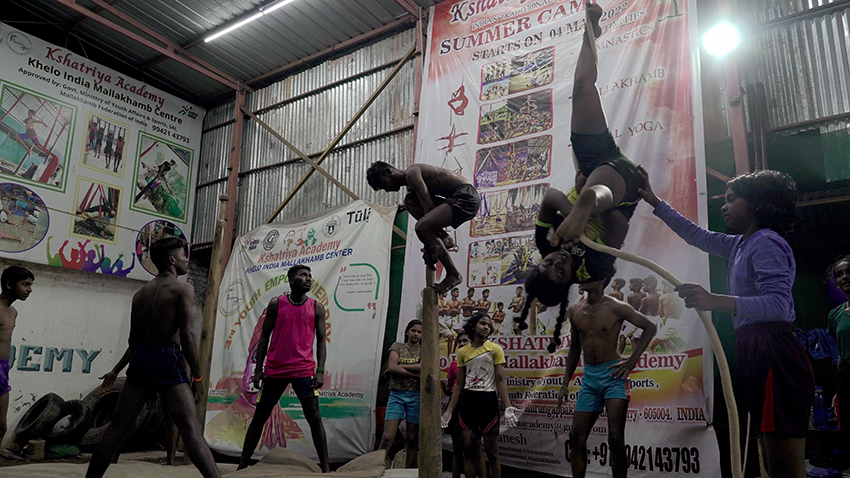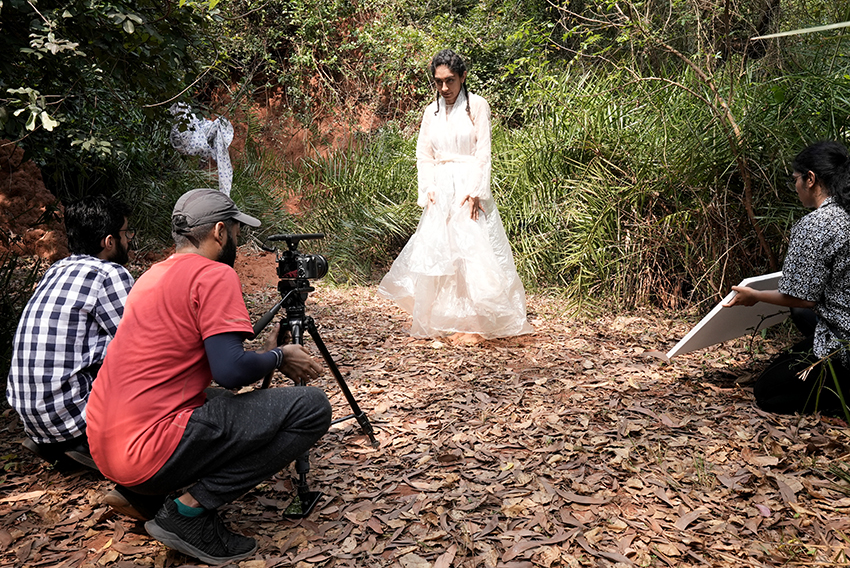Ashavari Majumdar




Project Period: Six months
This Foundation Project implemented by IFA under Workshops, Residencies, Seminars, will create a residency for movement artists and filmmakers to collaboratively explore a language for the practice of Indian dance-film, with a focus on non-classical and marginalised movement forms. Ashavari Majumdar is the Coordinator for this project.
Ashavari Majumdar (aka Vajrasara) is a cross-media artist trained in Kathak and literary critique. She taught Kathak at Kalashram, Delhi and was founder member of Gati Dance Forum. She has a Masters in English literature from the University of Delhi and a Bachelors Honours in English literature from St Stephen’s College, Delhi. She is the co-founder of Auropaar, a dance-film collective that supports initiatives that bridge traditional performances and digital technologies. She is the Director of Manifest International Dance-Film Festival, which had its first edition in July 2022 in Auroville, Pondicherry. She also has a National Scholarship in Dance from CCRT and has been empaneled by the ICCR as a proficient soloist. Filmmaker Abhyuday Khaitan will be a collaborator in the implementation of this project. Given Ashavari’s experience she is best placed to be the Coordinator of this Foundation Project of IFA.
This project titled Manifest Incubator is conceptualised as a residency which will take a group of dancers, movement artists and filmmakers through the collaborative artistic journey with the practice of dance-films. The focus of the residency will be in evolving a language for Indian movement forms for the video/ film camera, with a special emphasis on non-classical and marginalised forms. The residency will take the participants from conceptualisation to the actual making of dance-films.
Performing arts, including dance have been enhanced through the use of technological innovations, like microphones, stage lighting, recorded music and amplifiers. Film is a technological innovation which has the potential to add another dimension to time-based art-forms, including dance. While the ‘dance-film’ is a 20th century genre, there has been an unprecedented focus on the potential of this form in the post-pandemic context, as dancers across the world started to explore dance-on-camera during the lockdown. However, the genesis of dance-films in India goes way back to Uday Shankar’s dance-film titled Kalpana that was made in 1948. Notwithstanding, dance-films are relatively unknown in India, and it is primarily the English-speaking elite who are interested in this inter-mediatic art form. In this project, in order to reach out to non-metropolitan practitioners as well the call for application for the residency will be open and in English and other Indian languages. The Project Coordinator will also reach out to her peer networks to solicit participation from the marginalised people who practice non-classical forms.
The applicants for the residency will be free to apply either as individuals or as pairs or groups. Both filmmakers and movement artists will need to demonstrate their experience in their respective art forms through the application. Applicants will be asked to submit a paragraph on their motivation and a page on the treatment of the proposed film. Shashadhar Acharya (faculty at FTII and NSD, who has made contributions to Chhau), Anita Ratnam (multi-disciplinary performer and choreographer), R Narayan Kumar (cinematographer), and Arjun Gourisaria (filmmaker) will be the mentors in this residency. Anita Ratnam and Narayan Kumar will also be consultants in the selection process.
After the final selection of the filmmakers and movement artists, they will be paired. The plan is to initiate discussions of the projects to be developed online in eight bi-weekly sessions over four weeks. These sessions will include conversations on the form of dance-films, with attention to various aspects of costume, sound, location, as well as cast and crew for the projects. Subsequently, the residency will start in the physical space of Pondicherry where the shooting will also take place. The residency will produce three to five dance-films, of which at least one dance-film will be based on a non-classical Indian movement form. The residency will also include the editing and post-production of the dance-films, for the participants to absorb and experience a well-rounded artistic process of making dance-film.
The outcome of the project is the residency and the dance-films aimed at evolving a contemporary movement language for Indian dance, focusing especially on marginalised forms. The Project Coordinator’s deliverables to IFA with the final report will be photographs, audio-visual documentation of the residency and the dance-films.
This project suitably addresses the framework of IFA’s Arts Practice programme in the manner in which it attempts to focus on the relatively unknown inter-mediatic practice of the dance-film in India with a focus on non-classical and marginalised movements which often remain invisible in the public domain.
IFA will ensure that the implementation of this project happens in a timely manner and funds expended are accounted for. IFA will also review the progress of the project at midterm and document it through an Implementation Memorandum. After the project is finished and all deliverables are submitted, IFA will put together a Final Evaluation to share with Trustees.
This project is made possible with support from Sony Pictures Entertainment Fund.
